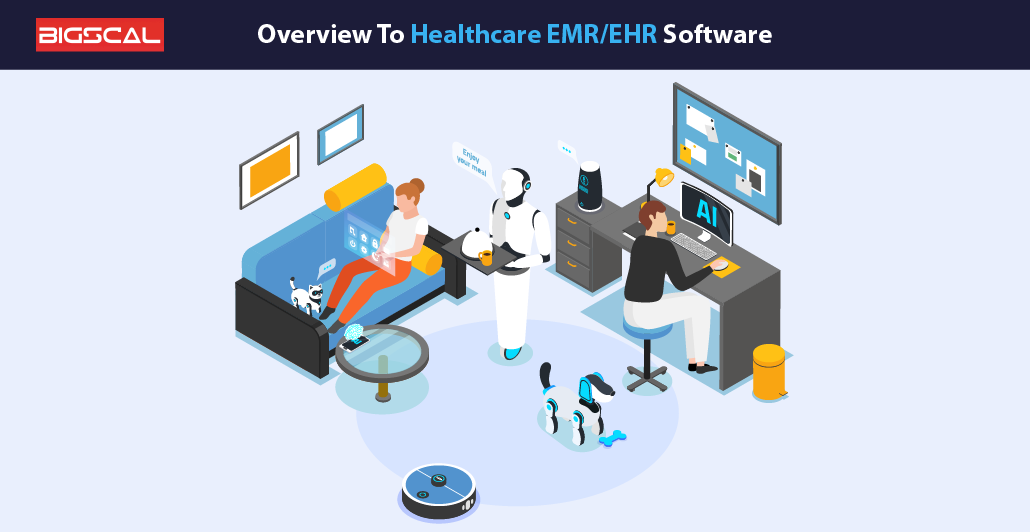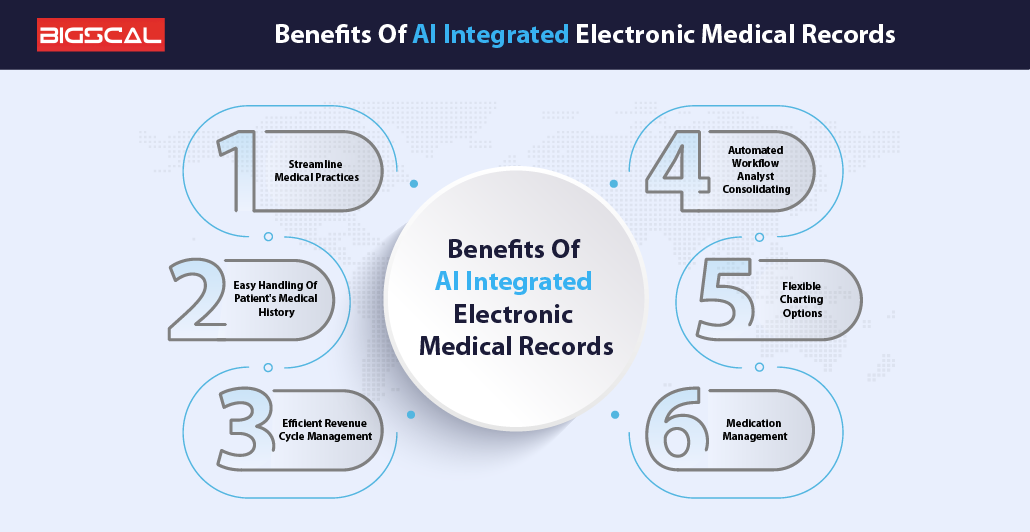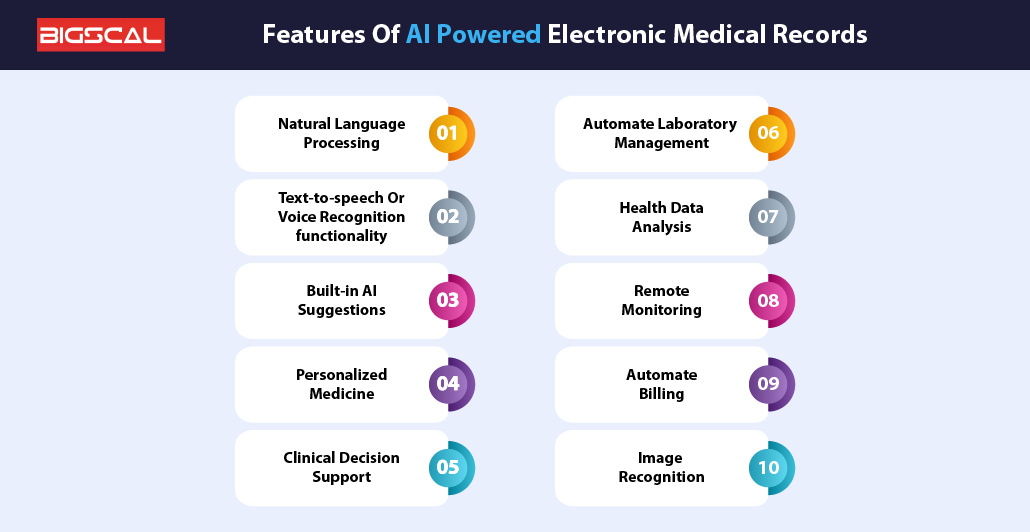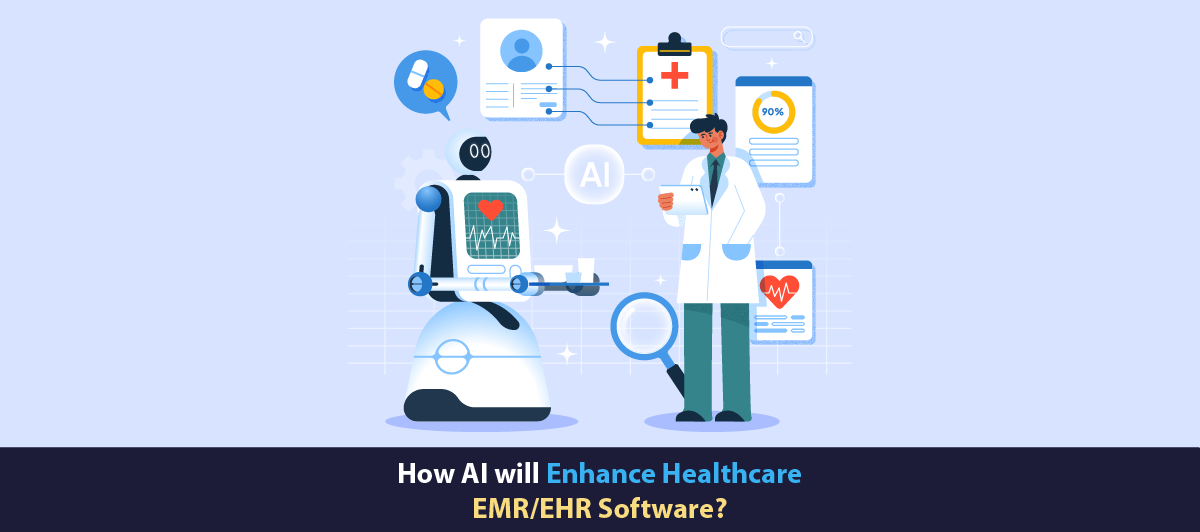How AI will Enhance Healthcare EMR/EHR Software in 2024?
Quick Summary: AI is revolutionizing every industry including healthcare. In healthcare it is healthcare EMR/EHR software by streamlining processes and improving patient care. Through advanced algorithms, AI is able to quickly and accurately analyze vast amounts of medical data. It leads to more accurate diagnoses and personalized treatment plans. Check out all ways in which AI transforms EMR/EHR Software!
Introduction
In this evolving world you must keep up-to-date with new trends. So, in this segment we are here to talk about how you can enhance Healthcare Software Development with AI. The integration of AI into healthcare EMR/EHR software systems transforming health care delivery. It is changing the way doctors manage, analyze and use health data. With that it helps in improving patient care outcomes.
But what exactly does it provide?
With advanced machine learning algorithms, AI is able to efficiently process large amounts of patient data, identifying patterns and insights that human operators may overlook. Not only does this capability facilitate faster diagnosis and not only to treat disease but also supports proactive health care and preventive measures.
Additionally, AI-powered EMR/EHR systems have the potential to improve efficiencies, reduce paperwork burdens for healthcare providers, further patient engagement, and increase interoperability between healthcare systems.
Read more about its benefits and how a Patient Management Software Development Raises Standards of care.
Overview To Healthcare EMR/EHR Software

Electronic medical record (EMR) and electronic health record (EHR) software are changing the way health care providers manage patient data. EMR/EHR software simplifies documentation, allowing health care providers to record, store, and access patient information electronically. These charts contain patient demographics, medical histories, diagnoses, medications, treatment plans, and lab results. They facilitate communication between healthcare professionals and patients, increasing coordination of care.
EMR/EHR systems offer many benefits, such as accurate and legible records, efficiency, and improved patient safety. Through medication communication and seizure alerts. It also supports regulatory compliance, such as HIPAA (Health Insurance Portability Accountability Act) for patient privacy and security. Ensuring compliance with standards further enhances value through other healthcare technologies such as payments and on the integration of telemedicine.
But challenges arise such as interoperability between systems, data security concerns, and learning curves associated with implementation and training Despite these challenges. EMR/EHR software continues to evolve to facilitate data-driven, providing decisions that improve patient outcomes. It increases overall efficiency in clinical workflow It plays an important role in the delivery practice management of modern health care.
Read more: Types Of Telemedicine: Benefits, Types, And Examples
Benefits Of AI Integrated Electronic Medical Records

Streamline Medical Practices
Integrating AI into the electronic medical record (EMR) streamlines medical practices by automating routine tasks, such as appointment scheduling, medical billing, and administration tasks for AI algorithms to analyze data faster and more accurately than humans What can, so that providers reduce paperwork time spent on health care. This collaboration frees up physicians to focus more on patient care, improving both efficiency and outcomes.
Easy Handling Of Patient’s Medical History
AI-powered EMRs make it easier for physicians to access and manage a patient’s medical history. With AI, EMRs can quickly organize and retrieve patient information, giving healthcare professionals detailed insights into patients’ health histories, including previous diagnoses, treatments and medications This approach facilitates clinical decision making progressive, personalized and effective for healthcare professionals. Check if there are issues you should do.
Efficient Revenue Cycle Management
AI helps healthcare organizations optimize revenue cycle management by automating payment processing, detecting legal errors, and streamlining insurance claims. By implementing AI systems, healthcare facilities can improve revenue and reduce costs, ultimately increasing economic growth and efficiency.
Automated Workflow Analyst Consolidating
An AI-enabled EMR performs a purposeful workflow analysis of large healthcare agencies by means of figuring out inefficiencies and suggesting process enhancements. By studying sizable amounts of records, AI can improve efficiency, streamline operations and reduce complexity, and make healthcare shipping less difficult and more efficient.
Flexible Charting Options
An AI-integrated EMR gives flexible scheduling alternatives, permitting healthcare providers to better record patient encounters. Whether through voice reputation, natural language processing, or custom templates, AI facilitates correct and well timed documentation, reducing administrative burdens and guarantees complete patient medical facts.
Medication Management
A.I. By studying patient records and medical hints for drug interactions, AI can help prescribe more secure and more effective medicines, reduce remedy mistakes and enhance affected person consequences. In addition, AI can reveal remedy compliance and offer tailor-made suggestions to optimize remedy regimens.
Read more: How Patient Relationship Management Software Helping The Healthcare Sector
Features Of AI Powered Electronic Medical Records and Electronic Health Records Software

Natural Language Processing
Natural Language Processing (NLP) enables Electronic Patient Management System and electronic health record (EHR) software to understand and interpret human language By analyzing unstructured data, such as patient information or medical records.
NLP algorithms extract context, identify key medical concepts , and accurately categorize data These functions simplify data entry, improve documentation accuracy, and increase overall healthcare professional productivity. NLP also facilitates advanced analytics, enabling healthcare professionals to quickly derive specific information from big data, ultimately leading to better decision-making and patient care.
Text-to-speech Or Voice Recognition functionality
Text-to-speech (TTS) and voice recognition services enable healthcare providers to interact with EMR/EHR systems through spoken commands or prompts Not only does this feature enhance the user experience by not only reducing manual data entry but also improving performance by enabling hands-free operation.
TTS converts text to audible speech, makes it easily accessible to the visually impaired, and increases overall software usability. Voice recognition technology accurately transcribes spoken words into text , enabling easy documentation of patient encounters and reducing time spent on administrative tasks.
Built-in AI suggestions
Embedded AI recommendations use machine learning algorithms to provide real-time recommendations and insights to healthcare professionals. Analyzing historical data, patient records, and clinical guidelines, these recommendations provide personalized treatment plans, medication recommendations, and diagnostic insights This service supports health professionals to make informed decisions, improve patient outcomes, and increase overall productivity.
Additionally, AI recommendations can help identify potential errors or inconsistencies in patient record and documentation, ensure data integrity and compliance with regulatory standards. Overall, embedded AI recommendations for healthcare employees are able to provide a higher quality of care, reducing cognitive and administrative burden.
Personalized Medicine
AI-powered electronic medical record (EMR) and electronic health record (EHR) software are transforming healthcare by enabling personalized medicine. Through advanced algorithms and data analytics, these systems can integrate patient-specific information including genetic profile, medical history, lifestyle factors and treatment response By analyzing this vast data on it, AI can identify patterns and correlations that accurately diagnose the disease and create a customized treatment plan.
Personalized medicine enables health care providers to provide personalized care that meets each patient’s unique symptoms and needs. This approach improves treatment effectiveness, reduces side effects, and improves patient outcomes. AI-powered EMR/EHR systems provide healthcare professionals with actionable insights to facilitate informed decision-making at every stage of patient care.
Clinical Decision Support
AI-powered EMR/EHR software provides comprehensive clinical decision support tools that automate clinical workflows to help healthcare professionals make informed decisions at the point of care. These systems use machine learning algorithms to analyze patient data, medical literature, best practices and clinical guidelines to deliver real-time recommendations and alerts
Clinical decision support tools help healthcare professionals diagnose conditions, choose appropriate treatments, and manage patient care more effectively. By integrating evidence-based knowledge into business processes, AI enhances clinical decision making, reduces errors, and ensures adherence in medical practice to best practices This approach contributes to better patient outcomes and improves patient safety.
Automate Laboratory Management
Healthcare EHR Software simplifies lab management processes by automating a variety of tasks. These tasks include test scheduling, result interpretation, and report generation. These systems use machine learning algorithms to analyze lab data, identify anomalies, and prioritize important results.
Automated laboratory management improves efficiency, reduces turnaround time, and reduces errors associated with manual processes. Along with seamless laboratory information systems and patient portals, this EMR/EHR software enables seamless data exchange. Which also enhances collaboration between healthcare providers and laboratory professionals.
Health Data Analysis
Healthcare EMR/EHR software excels in data analytics capabilities, using advanced algorithms to process and interpret large amounts of patient information. This includes demographic information, medical history, lab results, medication records, and so on. Through data analysis, AI discovers patterns, trends, and relationships that may not be immediately obvious to human users. This allows health care providers to make data-driven decisions, predict patient outcomes, and tailor treatment plans accordingly.
Additionally, AI-driven data analytics facilitates population health management. It identifying at-risk patient populations, monitoring disease progression, and analyzing intervention effectiveness. While AI brings the power of data sizes and machine learning applications. AI empowers healthcare organizations to improve resource utilization, improve care quality and reduce healthcare costs.
Remote Monitoring
AI-powered EMR and EHR software combine with wearable devices and sensors to facilitate remote patient care. These systems continuously collect and analyze real-world health data. This data includes vital signs, activity levels, and medication adherence from patients in their homes. Other remote and health-providing locations staff are able to monitor patients’ health status remotely. It recognizes early warning signs of deterioration, and intervenes early to prevent complications or hospital readmissions.
Remote delivery of AI-enabled software that enables quick and personalized monitoring of care increases patient engagement. It enhances self-management and improves overall health outcomes.
Automate Billing
AI-powered EMR and EHR software streamlines the payment process by automating coding, documentation, and reimbursement processing. This system uses natural language processing and machine learning algorithms to interpret clinical data, procedures and analytics and automatically generate accurate billing rules and claims.
Payment through manual data entry and human error reduction increases payment efficiency. It also accelerates revenue cycles. Further, it ensures compliance with payment regulations and payer requirements Ktam. AI -Driven software can identify coding anomalies or documentation gaps possible. And it enables healthcare organizations to proactively address billing errors and reduce revenue.
Image Recognition
AI EMR/EHR software incorporates image recognition capabilities. It help healthcare professionals interpret medical images such as X-rays, MRIs, CT scans, pathology slides, etc. By analyzing image data , AI algorithms can detect abnormalities, classify findings, and assist in disease diagnosis. Image recognition technology enables faster and more accurate interpretation of medical images, reduces turnaround time and facilitates timely intervention
Additionally, AI-driven image recognition enhances collaboration among healthcare providers by enabling remote conversations and second opinions. It also improves patient care by ensuring that important findings are not overlooked and that appropriate immediate follow-up measures are taken. Overall, AI-driven image recognition enhances diagnostic accuracy, improves patient outcomes, and contributes to overall quality of life
Workflow Optimization
AI in healthcare EMR/EHR software patient portals offer tremendous benefits for optimizing business processes. These systems use artificial intelligence algorithms to streamline processes, improve productivity and efficiency.
First, AI algorithms can automate routine tasks such as data entry, documentation, and appointment scheduling. By automatically capturing and organizing patient data, healthcare professionals can save valuable time and better focus on patient care.
Additionally, these systems facilitate seamless communication and collaboration among members of the healthcare team by centralizing patient data. It enables real-time innovation. This ensures that everyone with and participates in patient care receives up-to-date information, and makes informed decisions quickly.
Population Health Management
AI-powered EMR/EHR software will play a key role in population health management. As it leverages advanced analytics and predictive modeling techniques to improve health outcomes for all patient populations.
A key factor is the ability to identify at-risk patients and actively intervene to prevent or manage chronic conditions. By analyzing patient data and identifying patterns and trends, healthcare providers can develop personalized care plans.
Additionally, AI algorithms can analyze population health data to identify trends, incidence, and patterns of disease in the community. This enables healthcare organizations to implement targeted interventions and public health strategies to improve overall community health outcomes.
Read more: When Was Telemedicine Invented? History Of Telemedicine
How Bigscal Technologies Can Integrate AI in Healthcare EMR/EHR Software System
Do you want to integrate AI in your Healthcare EMR/EHR Software System then approach Bigscal Technologies…
At Bigscal Technologies, we use state-of-the-art machine learning algorithms and natural language processing techniques to integrate AI into healthcare EMR/EHR software systems. Our approach involves analyzing large amounts of patient data to identify patterns, trends, and insights. These will improve clinical decision making and streamline administrative tasks. Through AI-powered predictive analytics, we can anticipate potential health problems, optimize treatment plans, and optimize patient care.
Additionally, we are using AI-powered chatbots to facilitate patient engagement, answer questions and coordinate appointments. By seamlessly integrating AI into our EMR/EHR software, we aim to empower healthcare professionals with powerful tools. So, that reduces administrative burdens and drives accuracy, efficiency and patient outcomes effectiveness. Our commitment to innovation ensures that our AI solutions continue to evolve. It keeps pace with advances in technology and healthcare practices.
Conclusion
That’s all about how AI can elevate the healthcare EHR software. The integration of AI into healthcare EMR/EHR software has tremendous potential to transform patient care. From streamlining administrative tasks to improving the accuracy of diagnoses and treatment recommendations. AI offers benefits that can ultimately increase efficiency, reduce errors and provide results for patients to improve.
FAQ
What are practice management solutions?
Practice management solutions are software tools designed to streamline administrative tasks across a range of professional practices. This includes healthcare or legal, including scheduling, billing, record keeping, and communicating with clients or patients.
What are acute and ambulatory settings?
The acute condition refers to a healthcare situation in which patients receive short-term intensive care, usually in hospitals. Ambulatory centers are outpatient healthcare services that do not require patients to be admitted overnight.
What are the different types of EMR?
Electronic medical record (EMR) systems are available, including cloud-based EMRs, server-based EMRs, and specialty EMRs designed for health specialties such as oncology or psychiatry.
What is certified EHR technology?
Certified electronic health record (EHR) technology refers to software that meets specific standards set by the Office of the National Coordinator for Health Information Technology (ONC). This certification ensures that the technology meets standards for usability, performance, security, and data exchange, as defined by federal regulations.
What is HIPAA compliance?
HIPAA compliance means compliance with Health Insurance Portability and Accountability Act (HIPAA) regulations. Which are designed to protect the privacy and security of patient health information. Compliance includes the use of systems, processes and technologies though protect patient data and ensure confidentiality, integrity and availability.







